00015英语二课文精讲讲义(4)
- 格式:doc
- 大小:2.15 MB
- 文档页数:14
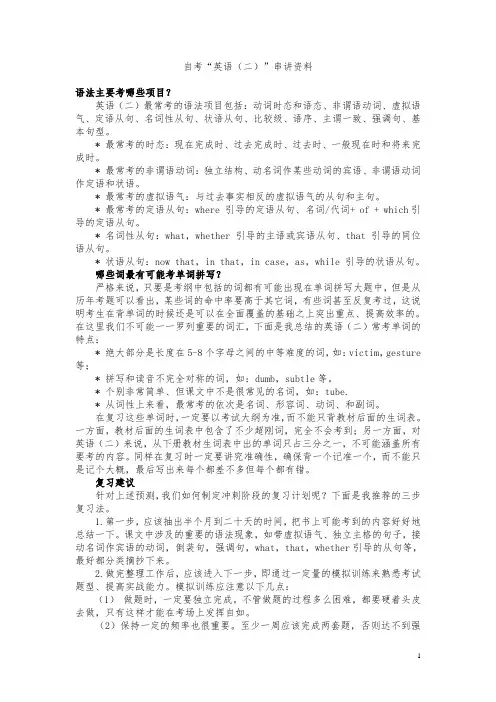
自考“英语(二)”串讲资料语法主要考哪些项目?英语(二)最常考的语法项目包括:动词时态和语态、非谓语动词、虚拟语气、定语从句、名词性从句、状语从句、比较级、语序、主谓一致、强调句、基本句型。
* 最常考的时态:现在完成时、过去完成时、过去时、一般现在时和将来完成时。
* 最常考的非谓语动词:独立结构、动名词作某些动词的宾语、非谓语动词作定语和状语。
* 最常考的虚拟语气:与过去事实相反的虚拟语气的从句和主句。
* 最常考的定语从句:where 引导的定语从句、名词/代词+ of + which引导的定语从句。
* 名词性从句:what,whether 引导的主语或宾语从句、that 引导的同位语从句。
* 状语从句:now that,in that,in case,as,while 引导的状语从句。
哪些词最有可能考单词拼写?严格来说,只要是考纲中包括的词都有可能出现在单词拼写大题中,但是从历年考题可以看出,某些词的命中率要高于其它词,有些词甚至反复考过,这说明考生在背单词的时候还是可以在全面覆盖的基础之上突出重点、提高效率的。
在这里我们不可能一一罗列重要的词汇,下面是我总结的英语(二)常考单词的特点:* 绝大部分是长度在5-8个字母之间的中等难度的词,如:victim,gesture 等;* 拼写和读音不完全对称的词,如:dumb,subtle等。
* 个别非常简单、但课文中不是很常见的名词,如:tube.* 从词性上来看,最常考的依次是名词、形容词、动词、和副词。
在复习这些单词时,一定要以考试大纲为准,而不能只背教材后面的生词表。
一方面,教材后面的生词表中包含了不少超刚词,完全不会考到;另一方面,对英语(二)来说,从下册教材生词表中出的单词只占三分之一,不可能涵盖所有要考的内容。
同样在复习时一定要讲究准确性,确保背一个记准一个,而不能只是记个大概,最后写出来每个都差不多但每个都有错。
复习建议针对上述预测,我们如何制定冲刺阶段的复习计划呢?下面是我推荐的三步复习法。
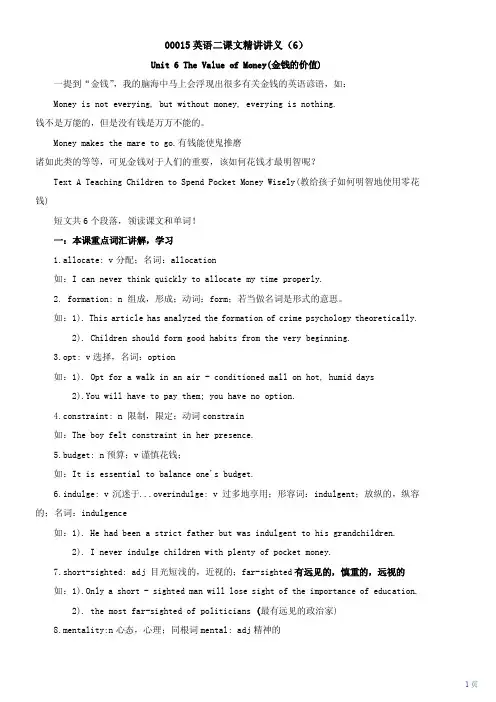
00015英语二课文精讲讲义(6)Unit 6 The Value of Money(金钱的价值)一提到“金钱”,我的脑海中马上会浮现出很多有关金钱的英语谚语,如:Money is not everying, but without money, everying is nothing.钱不是万能的,但是没有钱是万万不能的。
Money makes the mare to go.有钱能使鬼推磨诸如此类的等等,可见金钱对于人们的重要,该如何花钱才最明智呢?Text A Teaching Children to Spend Pocket Money Wisely(教给孩子如何明智地使用零花钱)短文共6个段落,领读课文和单词!一:本课重点词汇讲解,学习1.allocate: v分配;名词:allocation如:I can never think quickly to allocate my time properly.2. formation: n 组成,形成;动词:form;若当做名词是形式的意思。
如:1). This article has analyzed the formation of crime psychology theoretically.2).Children should form good habits from the very beginning.3.opt: v选择,名词:option如:1).Opt for a walk in an air - conditioned mall on hot, humid days2).You will have to pay them; you have no option.4.constraint: n 限制,限定;动词constrain如:The boy felt constraint in her presence.5.budget: n预算;v谨慎花钱;如:It is essential to balance one's budget.6.indulge: v沉迷于...overindulge: v 过多地享用;形容词:indulgent;放纵的,纵容的;名词:indulgence如:1). He had been a strict father but was indulgent to his grandchildren.2). I never indulge children with plenty of pocket money.7.short-sighted: adj 目光短浅的,近视的;far-sighted有远见的,慎重的,远视的如:1).Only a short - sighted man will lose sight of the importance of education.2). the most far-sighted of politicians (最有远见的政治家)8.mentality:n心态,心理;同根词mental: adj精神的如: He has many years' experience of the criminal mentality.(他研究犯罪心理有多年经验)9.rationing:n定量配给;ration v限量供应如:1). We have to ration the water.2).Food rationing was abolished in that country long ago.10.unnecessarily: adv没有必要地;同根词:necessary:adj; unnecessary: adj;如:1). It’s very foolish of the commander to expose his men to unnecessary risks.2). It is necessary for us to drink enough water every day.11.differentiate: v区分(相当于distinguish),同根词:different: adj; difference: n如:1). It’s improper to differentiate between pupils according to their family background.2).Children do not know by instinct the difference between right and wrong.12.resist: v抵挡,名词:resistance,一起学习 temptation: n 诱惑如:1). We anticipate that we will meet a certain amount of resistance to our plan.2). Most girls can’t resist the temptation of chocolates.二.课文重点短语,句子分析、讲解:1. Parents give pocket money to their children in different ways. Some give a lump sum at the beginning of a month or a week. Others prefer to give pocket money on a daily basis.译文:父母以不同的方式给孩子零花钱。

00015英语二课文精讲讲义(6)Unit 6 The Value of Money(金钱的价值)一提到“金钱”,我的脑海中马上会浮现出很多有关金钱的英语谚语,如:Money is not everying, but without money, everying is nothing.钱不是万能的,但是没有钱是万万不能的。
Money makes the mare to go.有钱能使鬼推磨诸如此类的等等,可见金钱对于人们的重要,该如何花钱才最明智呢?Text A Teaching Children to Spend Pocket Money Wisely(教给孩子如何明智地使用零花钱)短文共6个段落,领读课文和单词!一:本课重点词汇讲解,学习1.allocate: v分配;名词:allocation如:I can never think quickly to allocate my time properly.2. formation: n 组成,形成;动词:form;若当做名词是形式的意思。
如:1). This article has analyzed the formation of crime psychology theoretically.2).Children should form good habits from the very beginning.3.opt: v选择,名词:option如:1).Opt for a walk in an air - conditioned mall on hot, humid days2).You will have to pay them; you have no option.4.constraint: n 限制,限定;动词constrain如:The boy felt constraint in her presence.5.budget: n预算;v谨慎花钱;如:It is essential to balance one's budget.6.indulge: v沉迷于...overindulge: v 过多地享用;形容词:indulgent;放纵的,纵容的;名词:indulgence如:1). He had been a strict father but was indulgent to his grandchildren.2). I never indulge children with plenty of pocket money.7.short-sighted: adj 目光短浅的,近视的;far-sighted有远见的,慎重的,远视的如:1).Only a short - sighted man will lose sight of the importance of education.2). the most far-sighted of politicians (最有远见的政治家)8.mentality:n心态,心理;同根词mental: adj精神的如: He has many years' experience of the criminal mentality.(他研究犯罪心理有多年经验)9.rationing:n定量配给;ration v限量供应如:1). We have to ration the water.2).Food rationing was abolished in that country long ago.10.unnecessarily: adv没有必要地;同根词:necessary:adj; unnecessary: adj;如:1). It’s very foolish of the commander to expose his men to unnecessary risks.2). It is necessary for us to drink enough water every day.11.differentiate: v区分(相当于distinguish),同根词:different: adj; difference: n如:1). It’s improper to differentiate between pupils according to their family background.2).Children do not know by instinct the difference between right and wrong.12.resist: v抵挡,名词:resistance,一起学习 temptation: n 诱惑如:1). We anticipate that we will meet a certain amount of resistance to our plan.2). Most girls can’t resist the temptation of chocolates.二.课文重点短语,句子分析、讲解:1. Parents give pocket money to their children in different ways. Some give a lump sum at the beginning of a month or a week. Others prefer to give pocket money on a daily basis.译文:父母以不同的方式给孩子零花钱。

英语(二)讲义【00015】【内部资料】课程介绍一、课程性质英语(二)是高等教育自学考试各专业(英语专业除外)本科阶段的公共基础课。
目录第一部分语法知识 (4)第一单元名词形容词副词介词 (4)第一章名词 (4)第二章形容词 (5)第三章副词 (8)第四章介词 (10)第二单元谓语动词 (11)第一章系动词 (12)第二章情态动词 (12)第三章时态 (13)第四章英语语态 (16)第三单元非谓语动词 (17)第一章动词不定式 (18)第二章分词 (19)第四单元从句 (21)第一章名词性从句 (21)第二章形容词从句(定语从句) (21)第三章副词从句(状语从句) (21)第五单元并列结构 (22)第二部分应对技巧 (24)第一章阅读判断 (24)第二章阅读选择 (28)第三章概括段落大意和补全句子 (33)第四章填句补文 (36)第五章填词补文 (38)第六章完形补文 (40)第七章短文写作 (41)第一部分语法知识第一单元名词形容词副词介词第一章名词一、概念名词表示人、事物、地点或抽象概念的名称。
如:person,phone,China,time二、用法1.名词作主语和宾语。
●Knowledge is power.(知识就是力量。
)●I love English.(我喜欢英语。
)2.名词可以作定语修饰名词①作定语的名词往往是说明其中名词的材料、用途、时间、地点、内容、类别等②被修饰的名词变复数时,一般情况下,作定语用的名词不需要变为复数形式。
●a diamond ring(一枚钻戒)●orange juice(橙汁)●English lessons(英语课)3.名词分为可数名词和不可数名词,可数名词出现时,要么是复数名词,要么前面加限定词,如冠词(a、an或the),不可数名词永远是单数形式。
●He has a girlfriend.(他有一个女朋友。
)●He has two girlfriends.(他有两个女朋友。
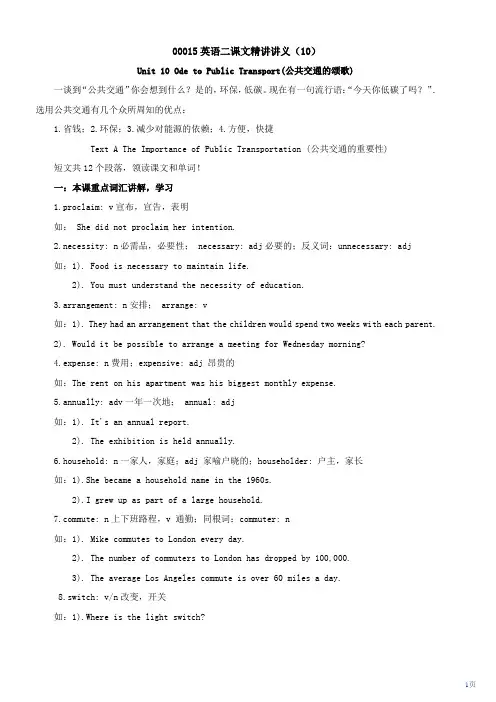
00015英语二课文精讲讲义(10)Unit 10 Ode to Public Transport(公共交通的颂歌)一谈到“公共交通”你会想到什么?是的,环保,低碳。
现在有一句流行语:“今天你低碳了吗?”.选用公共交通有几个众所周知的优点:1.省钱;2.环保;3.减少对能源的依赖;4.方便,快捷Text A The Importance of Public Transportation (公共交通的重要性) 短文共12个段落,领读课文和单词!一:本课重点词汇讲解,学习1.proclaim: v宣布,宣告,表明如: She did not proclaim her intention.2.necessity: n必需品,必要性; necessary: adj必要的;反义词:unnecessary: adj如:1).Food is necessary to maintain life.2). You must understand the necessity of education.3.arrangement: n安排; arrange: v如:1). They had an arrangement that the children would spend two weeks with each parent.2). Would it be possible to arrange a meeting for Wednesday morning?4.expense: n费用;expensive: adj 昂贵的如:The rent on his apartment was his biggest monthly expense.5.annually: adv一年一次地; annual: adj如:1). It's an annual report.2). The exhibition is held annually.6.household: n一家人,家庭;adj 家喻户晓的;householder: 户主,家长如:1).She became a household name in the 1960s.2).I grew up as part of a large household.mute: n上下班路程,v 通勤;同根词:commuter: n如:1). Mike commutes to London every day.2). The number of commuters to London has dropped by 100,000.3). The average Los Angeles commute is over 60 miles a day.8.switch: v/n改变,开关如:1).Where is the light switch?2). She switched her attention to films two years ago.9.transport: n运输工具;v运输,运送;transportation: n 交通运输系统如:1). Transport has always been the key to developing trade.2). public transportation (公共交通)10.carbon: n碳;low-carbon life低碳生活;carbon dioxide二氧化碳;carbon monoxide一氧化碳11.majority: n大多数;如:The majority of people interviewed prefer TV to radio.12.wean: v逐渐戒除恶习如:It can be extremely difficult to wean children off junk food.13.dependence: n依靠,依赖;dependent: adj依靠的;depend:v 依靠,依赖(单词的字根);independence: n 独立; independent: adj独立的如:1). The music festival is heavily dependent on sponsorship for its success.2).All living things depend on the sun for their growth.3). The country got its independence ten years ago.14.approximately: adv大约; approximate: v 接近于;adj 大概的如:1). His description of what happened approximated to the truth。
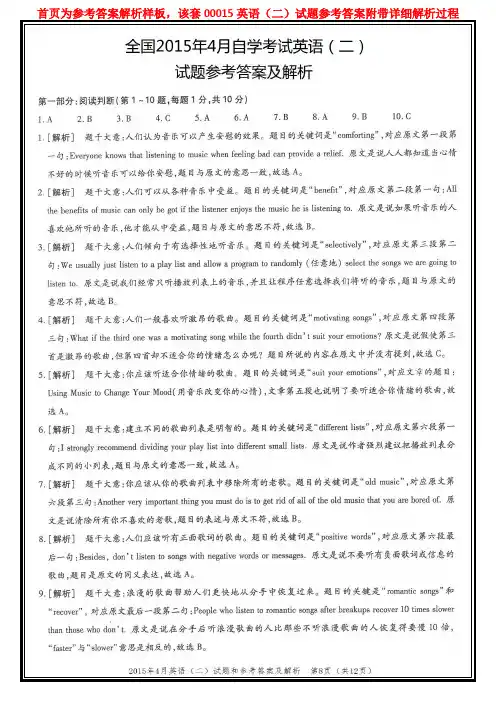
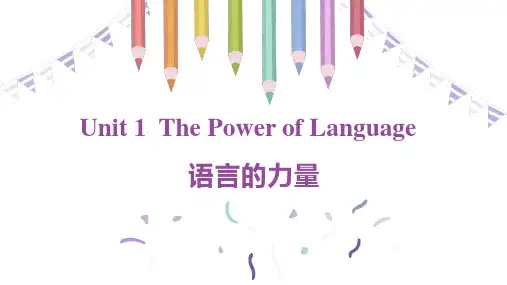
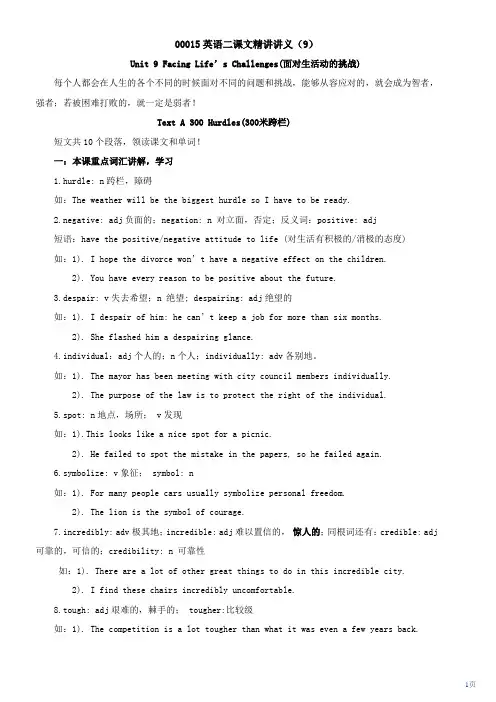
00015英语二课文精讲讲义(9)Unit 9 Facing Life’s Challenges(面对生活动的挑战) 每个人都会在人生的各个不同的时候面对不同的问题和挑战,能够从容应对的,就会成为智者,强者;若被困难打败的,就一定是弱者!Text A 300 Hurdles(300米跨栏)短文共10个段落,领读课文和单词!一:本课重点词汇讲解,学习1.hurdle: n跨栏,障碍如:The weather will be the biggest hurdle so I have to be ready.2.negative: adj负面的;negation: n 对立面,否定;反义词:positive: adj短语:have the positive/negative attitude to life (对生活有积极的/消极的态度)如:1). I hope the divorce won’t have a negative effect on the children.2). You have every reason to be positive about the future.3.despair: v失去希望;n 绝望; despairing: adj绝望的如:1). I despair of him: he can’t keep a job for more than six months.2). She flashed him a despairing glance.4.individual:adj个人的;n个人;individually: adv各别地。
如:1). The mayor has been meeting with city council members individually.2). The purpose of the law is to protect the right of the individual.5.spot: n地点,场所; v发现如:1).This looks like a nice spot for a picnic.2). He failed to spot the mistake in the papers, so he failed again.6.symbolize: v象征; symbol: n如:1). For many people cars usually symbolize personal freedom.2). The lion is the symbol of courage.7.incredibly: adv极其地;incredible: adj难以置信的,惊人的;同根词还有:credible: adj 可靠的,可信的;credibility: n 可靠性如:1). There are a lot of other great things to do in this incredible city.2). I find these chairs incredibly uncomfortable.8.tough: adj艰难的,棘手的; tougher:比较级如:1). The competition is a lot tougher than what it was even a few years back.2).. It was a tough decision to make.3). The meat was tough (咬不动的)and flavorless.4). He has a tough (坚韧的)character.9.arise: v(arose, arisen)产生,出现;形似单词:rise(rose, risen): v上升,上涨,起来如:1). Accidents often arise from carelessness.2). He watched the smoke rise from his cigarette.10.lost: adj 不知所措的;迷路的;如:1).I took a wrong turn and we got lost in the mountains.2).I feel lost and lonely in a strange town alone.11.leap: v跳跃如:Look before you leap. (三思而后行)同义词辨析:jump, leapjump 是个通用词,不管是从高处跳到低处,或从一点跳到另一点,都可使用意思是:“跳”,“跃”。
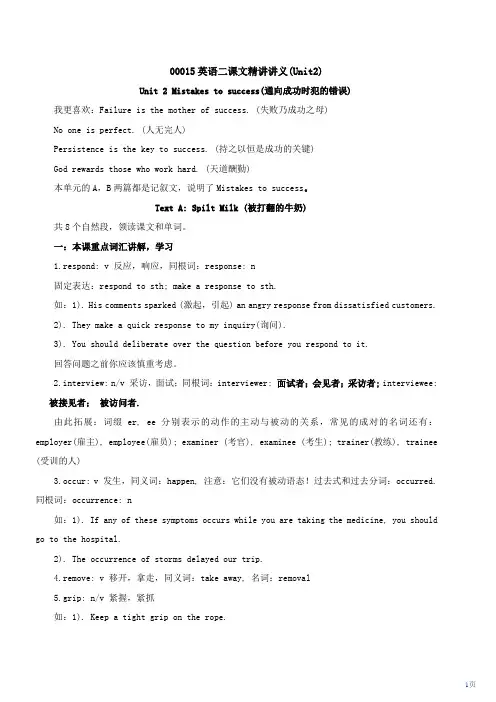
00015英语二课文精讲讲义(Unit2)Unit 2 Mistakes to success(通向成功时犯的错误)我更喜欢:Failure is the mother of success. (失败乃成功之母)No one is perfect. (人无完人)Persistence is the key to success. (持之以恒是成功的关键)God rewards those who work hard. (天道酬勤)本单元的A,B两篇都是记叙文,说明了Mistakes to success。
Text A: Spilt Milk (被打翻的牛奶)共8个自然段,领读课文和单词。
一:本课重点词汇讲解,学习1.respond: v 反应,响应,同根词:response: n固定表达:respond to sth; make a response to sth.如:1). His comments sparked (激起,引起) an angry response from dissatisfied customers.2). They make a quick response to my inquiry(询问).3). You should deliberate over the question before you respond to it.回答问题之前你应该慎重考虑。
2.interview: n/v 采访,面试;同根词:interviewer: 面试者;会见者;采访者; interviewee:被接见者;被访问者.由此拓展:词缀er, ee分别表示的动作的主动与被动的关系,常见的成对的名词还有:employer(雇主), employee(雇员); examiner (考官), examinee (考生); trainer(教练), trainee (受训的人)3.occur: v 发生,同义词:happen, 注意:它们没有被动语态!过去式和过去分词:occurred. 同根词:occurrence: n如:1). If any of these symptoms occurs while you are taking the medicine, you should go to the hospital.2). The occurrence of storms delayed our trip.4.remove: v 移开,拿走,同义词:take away, 名词:removal5.grip: n/v 紧握,紧抓如:1). Keep a tight grip on the rope.2). She gripped the rope.6.veritable: adj 名符其实的,十足的如:1)It is a veritable heaven on earth.2)It was a veritable feast.7.yell: v叫喊,叫喊着说 n.叫喊,大声叫;(拉拉队员的)呼喊声Yell out: 喊出;yell at sb: 对某人喊叫如:1). Are you coming or not?' they yelled out after him.2). How can you yell at an old man like that?8.mess: n 肮脏,杂乱如:The room was in a mess .9.rarely: adv (= seldom)很少,不常,同根词:rare: adj如:1). The museum is full of rare and precious treasures.2). She is rarely seen in public nowadays.10.eventually: adv(= finally, at last)最终,终于eventually和finally在具体运用时有些区别:表示某事几经延迟或波折后最终发生,可以用eventually。
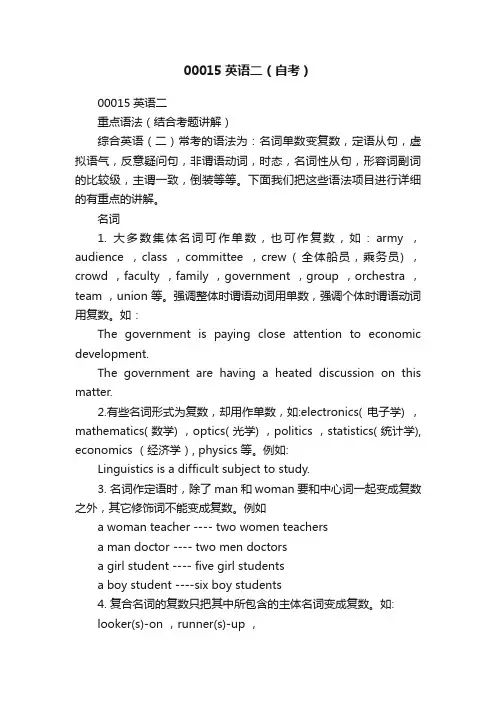
00015英语二(自考)00015英语二重点语法(结合考题讲解)综合英语(二)常考的语法为:名词单数变复数,定语从句,虚拟语气,反意疑问句,非谓语动词,时态,名词性从句,形容词副词的比较级,主谓一致,倒装等等。
下面我们把这些语法项目进行详细的有重点的讲解。
名词1. 大多数集体名词可作单数,也可作复数,如:army ,audience ,class ,committee ,crew ( 全体船员,乘务员) ,crowd ,faculty ,family ,government ,group ,orchestra ,team ,union 等。
强调整体时谓语动词用单数,强调个体时谓语动词用复数。
如:The government is paying close attention to economic development.The government are having a heated discussion on this matter.2.有些名词形式为复数,却用作单数,如:electronics( 电子学) ,mathematics( 数学) ,optics( 光学) ,politics ,statistics( 统计学), economics (经济学), physics 等。
例如:Linguistics is a difficult subject to study.3. 名词作定语时,除了man和woman要和中心词一起变成复数之外,其它修饰词不能变成复数。
例如a woman teacher ---- two women teachersa man doctor ---- two men doctorsa girl student ---- five girl studentsa boy student ----six boy students4. 复合名词的复数只把其中所包含的主体名词变成复数。
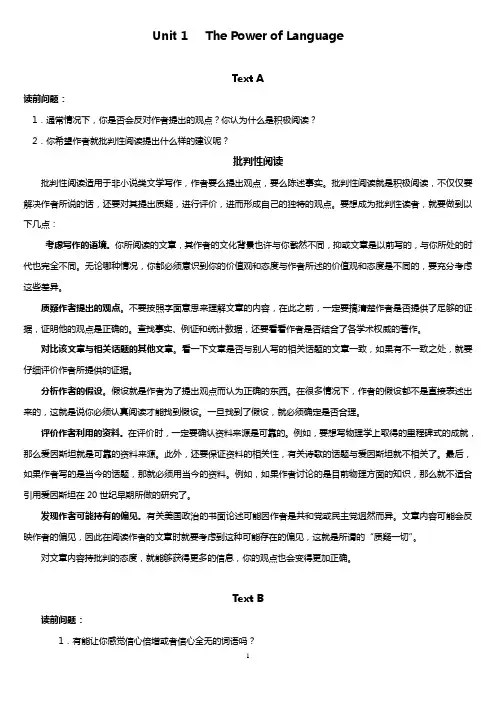
Unit 1 The Power of LanguageText A读前问题:1.通常情况下,你是否会反对作者提出的观点?你认为什么是积极阅读?2.你希望作者就批判性阅读提出什么样的建议呢?批判性阅读批判性阅读适用于非小说类文学写作,作者要么提出观点,要么陈述事实。
批判性阅读就是积极阅读,不仅仅要解决作者所说的话,还要对其提出质疑,进行评价,进而形成自己的独特的观点。
要想成为批判性读者,就要做到以下几点:考虑写作的语境。
你所阅读的文章,其作者的文化背景也许与你截然不同,抑或文章是以前写的,与你所处的时代也完全不同。
无论哪种情况,你都必须意识到你的价值观和态度与作者所述的价值观和态度是不同的,要充分考虑这些差异。
质疑作者提出的观点。
不要按照字面意思来理解文章的内容,在此之前,一定要搞清楚作者是否提供了足够的证据,证明他的观点是正确的。
查找事实、例证和统计数据,还要看看作者是否结合了各学术权威的著作。
对比该文章与相关话题的其他文章。
看一下文章是否与别人写的相关话题的文章一致,如果有不一致之处,就要仔细评价作者所提供的证据。
分析作者的假设。
假设就是作者为了提出观点而认为正确的东西。
在很多情况下,作者的假设都不是直接表述出来的,这就是说你必须认真阅读才能找到假设。
一旦找到了假设,就必须确定是否合理。
评价作者利用的资料。
在评价时,一定要确认资料来源是可靠的。
例如,要想写物理学上取得的里程碑式的成就,那么爱因斯坦就是可靠的资料来源。
此外,还要保证资料的相关性,有关诗歌的话题与爱因斯坦就不相关了。
最后,如果作者写的是当今的话题,那就必须用当今的资料。
例如,如果作者讨论的是目前物理方面的知识,那么就不适合引用爱因斯坦在20世纪早期所做的研究了。
发现作者可能持有的偏见。
有关美国政治的书面论述可能因作者是共和党或民主党迥然而异。
文章内容可能会反映作者的偏见,因此在阅读作者的文章时就要考虑到这种可能存在的偏见,这就是所谓的“质疑一切”。
00015自考英语二教程电子版大学英语自学教程(下)01-A. What Is a Decision?A decision is a choice made from among alternative courses of action that are available. The purpose of making a decision is to establish and achieve organizational goals and objectives. The reason for making a decision is that a problem exists, goals or objectives are wrong, or something is standing in the way of accomplishing them.Thus the decision-making process is fundamental to management. Almost everything a manager does involves decisions, indeed, some suggest that the management process is decision making. Although managers cannot predict the future, many of their decisions require that they consider possible future events. Often managers must make a best guess at what the future will be and try to leave as little as possible to chance, hut since uncertainty is always there, risk accompanies decisions. Sometimes the consequences of a poor decision are slight; at other times they are serious.Choice is the opportunity to select among alternatives. If there is no choice, there is no decision to be made. Decision making is the process of choosing, and many decisions have a broad range of choice. For example, a student may be able to choose among a number of different courses in order to implement the decision to obtain a college degree. For managers, every decision has constraints based on policies, procedures, laws, precedents, and the like. These constraints exist at all levels of the organization.Alternatives are the possible courses of action from whichchoices can be made. If there are no alternatives, there is no choice and, therefore, no decision. If no alternatives are seen, often it means that a thorough job of examining the problems has not been done. For example, managers sometimes treat problems in an either/or fashion; this is their way of simplifying complex problems. But the tendency to simplify blinds them to other alternatives.At the managerial level, decision making includes limiting alternatives as well as identifying them, and the range is from highly limited to practically unlimited.Decision makers must have some way of determining which of several alternatives is best -- that is, which contributes the most to the achievement of organizational goals. An organizational goal is an end or a state of affairs the organization seeks to reach. Because individuals (and organizations) frequently have different ideas about how to attain the goals, the best choice may depend on who makes the decision. Frequently, departments or units within an organization make decisions that are good for them individually but that are less than optimal for the larger organization. Called suboptimization, this is a trade-off that increases the advantages to one unit or function but decreases the advantages to another unit or function. For example, the marketing manager may argue effectively for an increased advertising budget. In the larger scheme of things, however, increased funding for research to improve the products might be more beneficial to the organization.These trade-offs occur because there are many objectives that organizations wish to attainsimultaneously. Some of these objectives are more important than others, but the order and degree of importance often varyfrom person to person and from department to department. Different managers define the same problem in different terms. When presented with a common case, sales managers tend to see sales problems, production managers see production problems, and so on.The ordering and importance of multiple objectives is also based, in part, on the values of the decision maker. Such values are personal; they are hard to understand, even by the individual, because they are so dynamic and complex. In many business situations different people's values about acceptable degrees of risk and profitability cause disagreement about the correctness of decisions.People often assume that a decision is an isolated phenomenon. But from a systems point of view, problems have multiple causes, and decisions have intended and unintended consequences. An organization is an ongoing entity, and a decision made today may have consequences far into the future. Thus the skilled manager looks toward the future consequences of current decisions. 01-B. Secrets of Success at an Interview The subject of today's talk is interviews.The key words here are preparation and confidence, which will carry you far.Do your homework first.Find out all you can about the job you are applying for and the organization you hope to work for.Many of the employers I interviewed made the same criticism of candidates. "They have no idea what the day to day work of the job brings about. They have vague notions of "furthering the compan y's prospects’ or of 'serving the community', but have never taken the trouble to find out theactual tasks they will be required to do.”Do not let this be said of you. It shows an unattractive indifference to your employer and to your job.Take the time to put yourself into the interviewer's place. He wants somebody who is hard-working with a pleasant personality and a real interest in the job.Anything that you find out about the prospective employer can be used to your advantage during the interview to show that you have bothered to master some facts about the people who you hope to work for.Write down (and remember) the questions you want to ask the interviewer(s) so that you are not speechless when they invite your questions. Make sure that holidays and pay are not the first things you ask about. If all your questions have been answered during the interview, reply: "In fact, I did have several questions, but you have already answered them all.”Do not be afraid to ask for clarification of something that has been said during the interview if you want to be sure what was implied, but do be polite.Just before you go to the interview, look again at the original advertisement that you answered,。
2018年4月高等教育自学考试全国统一命题考试英语(二) 试卷(课程代码 00015)满分l00分,考试时间l50分钟。
考生答题注意事项:1.本卷所有试题必须在答题卡上作答。
答在试卷上无效,试卷空白处和背面均可作草稿纸。
2.第一部分为选择题。
必须对应试卷上的题号使用2B铅笔将“答题卡”的相应代码涂黑。
3.第二部分为非选择题。
必须注明大、小题号,使用0.5毫米黑色字迹签字笔作答。
4.合理安排答题空间,超出答题区域无效。
选择题区第一部分:阅读判断(第1~l0题,每题l分,共10分)下面的短文后列出了l0个句子,请根据短文的内容对每个句子作出判断:如果该旬提供的是正确信息,选择A;如果该句提供的是错误信息,选择B;如果该旬的信息文中没有提及,选择C。
在答题卡相应位置上将答案选项涂黑。
Life on the FarmLife on a farm is always changing. New technologies and a rising interest in healthier and organic eating have had a huge impact on how farms do business. At the same time, a growing population has put more demands on farmers. They need to find ways to increase their production levels. The small family farms that used to produce most of the products have been largely replaced by factory farms. Small family farms that are still operating are struggling to keep up.Technology has made most aspects of farm life easier than it has ever been before. Bigger and more efficient equipment makes work such as plowing up fields and sowing the seeds easier. Such tasks used to take two or three times as long. These advances have allowed farmers to work faster and more efficiently than ever before.In addition to newer technology, factory farms produce more products for less money than traditional farming would require.Modern farm life, despite the introduction of new technologies, has not changed much from what has always been. Farmers still wake up early, and spend their days doing hard work. There are animals to feed, cows to be milked, and fields to be plowed. Farm still requires a lot of hard work and sacrifice.The main change in modern farm life is still in the way farms are run. It is common for even small farms to have several hired workers and even an animal manager. Family-run farms are becoming rarer. Factory farms, with other larger farm corporations, are becoming the norm. Although there are still many traditional family farms, they are quickly dying as modern practices change farm life forever.1.Factory farms now produce most of the productsA.TrueB. FalseC. Not given2.Farmers prefer to grow healthy and organic food.A.TrueB. FalseC. Not given3.Small family farms find it hard to surviveA.TrueB. FalseC. Not given4.Plowing and sowing by machines are advances in modern farmingA. TrueB. FalseC. Not given5. Modern farm products cost more than those from traditional farming.A.TrueB. FalseC. Not given6.Most farmers cannot afford new machines.A.TrueB. FalseC. Not given7.Modern farmers do not have to work hard.A.TrueB. FalseC. Not given8.New technologies have not changed farm management.A.TrueB. FalseC. Not given9.There are fewer and fewer family-fun farms now.A.TrueB. FalseC. Not given10.Modern farms are hiring workers from cities.A.TrueB. FalseC. Not given第二部分:阅读迭择(第11--15题,每渔2分,共10分)阅读下面短文,请从短文后所给各题的4个选项A、B、C、D冲选出1个最佳选项,并在答题卡相应位置上将该项涂黑Christmas GiftMary didn’t know what to send to her grandparents for Christmas. It was always hard to choose a good Christmas present for them. They didn’t need much, and it was hard for her to be creative every year.One year, she sent a big wooden elephant. It sat on the counter for a year, but then it disappeared, probably into a closet somewhere. Another year, she made handmade soaps with nice smells, but they probably weren’t any better than store-bought soaps. Last year, she sent lots of nice pictures of herself in frames, but grandparents’ house was small, and they couldn’t hang up very many.This year, she decided on fruit. She lived where it was warm and there was lots of nice fruit. Her grandparents lived up north, where it was colder and they couldn’t get fresh fruit all year, or at least not oranges and grapefruit. Fresh fruit was healthy for her grandparents, too.Mary went to a fruit store and sampled the red oranges. She really liked them and bought a kilogram. Then she tried three kinds of grapefruit. The white ones were sour. The star grapefruit were interesting, but the dark red grapefruit were great. So she got a kilogram.Mary carefully packed the fruit in a box to keep them safe and dry in case one got smashed and its juice got everywhere. Then she wrote the address on the box andmailed it from the store. She felt happy with what she bought. A few days later, Mary got a phone call from her grandparents, thanking her for the lovely fruit. They said it was a healthy, tasty, and very thoughtful gift. Mary had never felt so good before.11.Mary was troubled because she ___________.A.had no idea for a holiday giftB. was not creative in her workC. could not afford Christmas giftsD. found her grandma hard to please.12. What did Mary send her grandparents last year?A. a wooden elephantB. Handmade soapsC. her own picturesD. A store-bought closet.13. In selecting the gift, Mary was ___________ .A. excitedB. impatientC. exhaustedD. thoughtful14. Which of the following did Mary buy for her grandparents this year?A. Yellow orangesB. Dark red grapefruitC. White grapefruitD. Star grapefruit15. Mary’s grandparents ________.A. loved her giftB. send her a cardC. wrote her a letterD. put her gift away非选择题区第三部分:概括段落大意和补全句子(第16—25题,每题1分,共10分)阅读下面短文,请完成短文后的2项测试任务:⑴从第16~20题后所给的6个选项中为第1~5段每段迭择1个正确的小标题;⑵从第21~25题后所给的6个选项中迭择5个正确选项,分别完成每个句子。
00015英语二课文精讲讲义(12)Unit 12 A Break from Life人们经常说:会休息的人才会工作。
你会从紧张的工作学习中“偷得浮生半日闲”吗?Text A :Feeling Free(感受自由)短文共10个段落,领读课文和单词!一:本课重点词汇讲解,学习1.cranky: adj 脾气坏的如:His mother has been cranky recently.2.resemble: v看起来像;resemblance: n如:1). The movie bears little resemblance to the original novel, especially the plot development.2). She may resemble her father facially, but in other respects she's not at all like him.3.subside: v平息,减弱;如:She waited nervously for his anger to subside.4.ache: v/n疼痛;如:It makes one's heart ache to see such waste.同义词辨析:ache, painache 主要指肉体局部持续的疼痛或隐痛;而 pain的应用范围则较广,可指轻微的痛或剧烈的痛,可指局部的痛或全身的痛,可指持续的痛或突发的痛等。
如:The ache in his back lasted for two days. 他的背痛了两天。
The boy cried with pain. 这男孩痛得哭了起来由于ache 通常用于指局部的持续性疼痛,所以它经常与某些表示身体部位的词构成合成词,表示身体的某处疼痛(此时通常不用pain)。
如:headache (头痛),toothache (牙痛),stomachache (胃痛),earache (耳痛),backache (背痛),等等。
00015英语二课文精讲讲义(Unit4)Unit 4 The Joy of Work (工作的快乐)Text A Work is Blessing(工作是福)共7个自然段,领读课文和单词。
一:本课重点词汇讲解,学习1.blessing: n好事;动词:bless: v 祝福,保佑如:1). The rain will be a blessing for the farmers.2). May God bless you with a long life!plain: v 抱怨,埋怨;名词:complaint如:1). I’m going to complain to the manager about this.2). The most common complaint is about poor service.mitted: adj 尽心尽力的,坚定的;动词:commit犯罪,做错事;承诺,使…承担义务如:1). I have never committed any crime.2). I would like to commit myself to teaching all my life.3). She is a committed policewoman.4.remind: v提醒; reminder: n 提醒物如:Will you please remind me of his name?5.victim: n 受害者,牺牲品如:He said the female victim was his girlfriend。
6.terrorism: n 恐怖主义;terrorist: 恐怖分子7.depression: n 萧条,不景气,萎靡不振,沮丧。
如:1). She suffered from severe depression after losing her job.2). He never forgot the hardships he witnessed during the Great Depression (经济大萧条时期)of the 1930s.8.illegal: adj不合法的,反义词:legal合法的;legalize: v 使。
合法化如:1). It is illegal to buy cigarettes in Britain if you are under 16.2). What I did was perfectly legal.3). Divorce was legalized in 1981。
9.dealer: n 毒贩子;deal:n 买卖;dealership: n 代理权,经销权如:1). The campaign to drive the drug dealers away will continue.2). a car dealership (汽车特许经销商)10.contribute: v 增进,贡献;contribution: n如:1). Your suggestion will contribute to solving the problem.2). He was awarded a prize for his contribution to world peace.11.quit: v 放弃,同义词:give up, stop,如:1). If I don't get a pay rise I'll quit.2). He was trying to quit smoking at the time.二.课文重点短语,句子分析、讲解:(按照自然段)1. I grew up in Lakeland, Louisiana, one of 12 children. We all lived on my parents’ subsistence farm. We grew cotton, sugar cane, corn, hogs, chickens and had a large garden, but it didn’t bring in much cash. So when I was 12, I got a part time job on a dairy farm down the road, helping to milk cows. We milked 65 cows at 5 in the morning, and again at 2 in the afternoon, seven days a week.译文:我在路易斯安那州的莱克兰长大,是家里12个孩子之一。
我们所有人都依赖父母勉强维持生活的农场过活。
我们种棉花、甘蔗、玉米,养猪、养鸡,还有一个大花园,但农场没办法让我们有多少收入,所以我在12 岁时在马路前面不远的一个奶牛场里找了一份兼职工作——帮忙挤牛奶。
我们要在早晨5 点钟为65 头奶牛挤奶,下午2 点钟还要挤一次,一周七天不休息。
语言点:dairy是奶制品的意思,要区别于:diary:日记;a part time job兼职工作;而full timejob则是全职工作;固定搭配: live on:依靠。
而生活; bring in much cash:赚取足够多的钱。
2. In the kitchen one Saturday before daylight, I remember complaining to my father and grandfather about having to go milk those cows. My father said, "You know, boy, to work is a blessing." I looked at those two men who’d worked harder than I've ever had –my father eking out a living on that farm, and my grandfather farming and working as a carpenter during the Depression.译文:在一个周六的黎明之前,我记得我在厨房里跟父亲和爷爷抱怨自己一大早还要去给那些奶牛挤奶,父亲说:“儿子,你要知道,能工作是种福气啊。
”我看着这两个男人,知道他们比我有生以来工作得要更努力——父亲靠那个农场为全家糊口,而爷爷在大萧条期间既开农场又当木匠。
语言点:daylight天亮固定搭配:1).remember doing: 记得做过某事;如: I remember bringing my notebook. (but it isn’t in my bag)2).complain to sb about sth: 对某人抱怨某事;如: He always complains to us about his too much work.3).have to do sth: 不得不;4). eke out a living on sth:依靠。
而勉强度日;3. I had a feeling I had been told something really important, but it took many years before it sank in. Going to college was a rare privilege for a kid from Lakeland, Louisiana. My father told me :"If I’d picked something to study that I liked doing, I’d always look forward to my work." But he also added, “Even having a job you hate is better than not having a job at all."译文:我有种感觉——别人跟我说了一些确实重要的东西,但许多年后我才真正理解。
对路易斯安那莱克兰的孩子来说,上大学是种珍贵的待遇。
父亲跟我说:“如果我学了自己喜欢从事的内容,我便会一直期待找到适合自己的工作。
”但他补充道:“就算从事了自己不喜欢的工作,那也比什么工作都没有要好。
”语言点: took花费;固定搭配:1).sank in(原型:sink in)被完全理解;如: It took a moment for the joke to sink in before he laughed at it. (他过一会儿才懂得那个笑话的意思,于是大笑起来.)2).look forward to sth/doing sth: 期盼,盼望;如:We are looking forward to your e-mail.He is looking forward to getting his father’s money.3).not...at all:一点也不;根本就不4. I wanted to be a farmer, but I joined the ROTC(Reserve Officers’ Training Corps, ROTC)program to help pay for college. And what started out as an obligation to the Army became a way of life that I stayed committed to for 37 years, three months and three days. In the late 1980s, during a visit to Bangladesh, I saw a woman with her baby on her back, breaking bricks with a hammer. I asked a Bangladesh military escort why they weren’t using a machine, which would have been a lot easier. He told me a machine would put that lady out of work. Breaking those bricks meant she’d earn enough money to feed herself and her baby that day. And a s bad as that woman’s job was, it was enough to keep a small family alive. It reminded me of my father’s words: to work is a blessing.译文:我当时想做一名农夫,但为了减少学费负担,我参加了预备军官训练项目,随后的“义务”从军便成为了我的生活方式——我在部队一共待了 37 年三个月零三天。